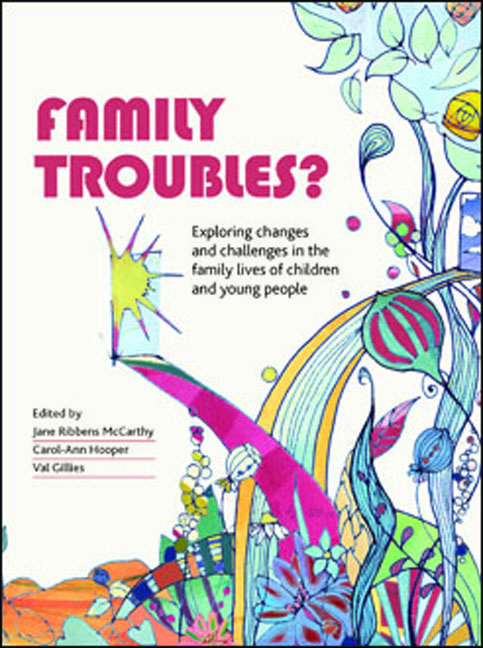Book contents
- Frontmatter
- Contents
- Notes on contributors
- Foreword
- Preface
- 1 Troubling normalities and normal family troubles: diversities, experiences and tensions
- Part One Approaching family troubles ? Contexts and methodologies :Introduction to Part One
- Part Two Whose trouble ? Conteste d definitions and practice: Introduction to Part Two
- Part Three The Normal, The Troubling And The Harmful?: Introduction to Part Three
- Part Four Troubles and transitions across space and culture: Introduction to Part Four
- Part Five Working With Families: Introduction to Part Five
- Index
13 - Thinking about sociological work on personal and family life in the light of research on young people’s experience of parental substance misuse
Published online by Cambridge University Press: 07 September 2022
- Frontmatter
- Contents
- Notes on contributors
- Foreword
- Preface
- 1 Troubling normalities and normal family troubles: diversities, experiences and tensions
- Part One Approaching family troubles ? Contexts and methodologies :Introduction to Part One
- Part Two Whose trouble ? Conteste d definitions and practice: Introduction to Part Two
- Part Three The Normal, The Troubling And The Harmful?: Introduction to Part Three
- Part Four Troubles and transitions across space and culture: Introduction to Part Four
- Part Five Working With Families: Introduction to Part Five
- Index
Summary
Parental substance misuse (PSM) has been the focus of much applied social policy work in recent years (ACMD, 2003, 2007). It has been estimated that two million young people in the UK are affected by PSM (Manning et al, 2009), with significant implications for social work caseloads. Such circumstances are relatively absent, however, from recent mainstream sociological discussion of personal and family life. Here, partly in response to the pathologisation of family diversity and change in some literature (Beck-Gernsheim, 1998; Bauman, 2003) and in the New Right family policy it has influenced, much work has focused on continuities in ‘ordinary’ family practices (Strathern, 1992; Gross, 2005; Charles et al, 2008) and on ‘normalising’ to some degree certain family troubles, notably parental separation (Duncan and Edwards, 1999; Ribbens McCarthy et al, 2000). This interest in parental separation has had the result of focusing somewhat greater attention on adult, chosen relationships rather than on those of children and young people. Further, while there is a growing body of work on children's constructions of relationships, this has also focused on more ‘ordinary’ rather than more ‘troubled’ families (O’Brien et al, 1996; Mason and Tipper, 2008). Another strand of this recent sociological work has explored the high degree of contemporary anxiety around family life (Illouz, 2007; Mason, 2008) and the importance accorded to ‘displaying’ family, especially in less conventional circumstances (Finch, 2007). Some of this work has identified the current influence of a ‘psychoanalytic imagination’ (Illouz, 2007, p 7), according to which the experience of childhood within a nuclear family is viewed as the pre-eminent source of the construction of self, thus reinforcing perceptions of those with difficult early experiences as ‘damaged’.
This chapter draws on the author's experience of analysing data from two applied projects exploring young people's experiences of PSM (Bancroft et al, 2004; Houmøller et al, 2011) in the light of this recent sociological work on personal and family life. Presenting the results of this analysis has led to an uneasy ‘odd one out’ feeling at sociological conferences, where, in recent years (and in contrast to earlier feminist work on domestic violence), family diversity has been explored more in relation to differences of structure and formation than poverty, emotional neglect or physical abuse.
- Type
- Chapter
- Information
- Family Troubles?Exploring Changes and Challenges in the Family Lives of Children and Young People, pp. 163 - 172Publisher: Bristol University PressPrint publication year: 2013

